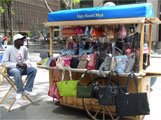 One of the recommendations of the final report released last Thursday by Project for Public Spaces--and one that is getting priority attention from the BIA--is the notion of getting more sidewalk vendors operating downtown...er, actually, getting any sidewalk vendors operating downtown...
One of the recommendations of the final report released last Thursday by Project for Public Spaces--and one that is getting priority attention from the BIA--is the notion of getting more sidewalk vendors operating downtown...er, actually, getting any sidewalk vendors operating downtown...Sidewalk vending is, essentially, small-scale selling by means of a cart (which has wheels and can be pushed or towed) or a kiosk (a small stand that does not move). The most complicated part of this small-scale selling is the regulatory framework. In the 1950's, many cities passed ordinances that restricted or even eliminated outdoor selling. Malls are private property, so the prohibitions on "public selling" did not apply. In the 1970's and 1980's, shopping malls found that vending carts in their open areas enhanced the quality of the mall, and they created large numbers of cart-based businesses. Urban planners learned from the malls and began encouraging sidewalk vending as an enhancement to the street life in a community.
The current regulations in Tacoma governing sidewalk vending were hammered out in the mid-1990s; it's time to revisit the municipal code again. The fact is that no sidewalk vendors are taking advantage of the opportunity to sell downtown, so something is presenting an obstacle. As a follow up to the PPS report, we are assembling a committee to look at what those obstacles are and to propose potential solutions.
A good starting point is looking at the experience of other communities to find examples of successful programs. Today we will offer two examples:
Thirty sidewalk vendors are licensed to sell a variety of merchandise and food products on the 16th Street Mall in downtown Denver. Specific sites are licensed in order to diversify the vendor's businesses on the Mall, while taking into consideration the continued success of restaurants and retail shops already in operation. Vendors have a specific set of rules and regulations determined by the Downtown Denver Business Improvement District and the City & County of Denver that they must follow in order to operate their carts on the Mall.
The Springfield, MO City Council recently approved a six-month trial period for sidewalk vending limited to a defined downtown area. Carts designed to meet the regulatory requirements cost about $5,000 and can run more than twice that, and each company has to have a health department-approved prep kitchen, carry liability insurance and agree to stay a certain distance away from other restaurants selling hot dogs — including other vendors. The Urban Districts Alliance, a nonprofit group that coordinates and promotes downtown investment, helped urban entrepreneurs develop guidelines that led to the city’s approval for this trial program.
Are there other successful programs we should be examining? Please post your suggestions and we will take a look!


I have read the Tacoma's "licensing" requirements for street vendors.
ReplyDeleteThey look to create an almost unsurmountable barrier for a street vendor.
The health code requirements are appropriate as is getting a simple license.
However, requiring $500,000 liability insurance is certainly too much.
Also, having to get permission from the adjacent property owners has no rational purpose other than to eliminate competition.
The city could make a specific exception for Pacific Plaza with minimal requirements and let it sunset in 6 months or a year.
Re: Carts -
ReplyDeleteWhile I wouldn't mind seeing carts throughout Tacoma. One idea could be to build vendor stalls in one of the many downtown parks which could be rented out. I've never understood why there isn't some sort of arts/crafts/misc market to coincide with the Farmers Market. Part of what makes the Pike Place market so unique is the row of independent vendors set up in the stalls located at the north end of the market.
Re: Pacific Plaza -
Was there any public process involved in its design? I would like to see policy level language to prevent creating public spaces with little public engagement.
Re: Pierce County Health Department -
The Tacoma/Pierce County Health Department needs to loosen up! It is much tougher than the State requires and is also more regressive than King County's.
I had an espresso business and can tell you first hand that the health department's requirements are overkill and add unnecessary start-up costs. In addition they have the same requirements for an espresso cart as they do a full service restaurant. While there may have been more risks involved with dairy products 30 years ago- the pasteurization process to days effectively kills anything that could possibly cause problems. After receiving pressure from Seattle's espresso businesses, the King County Health Department ran an experiment to see how long milk could be left out and still be safe to use. After much testing, they discovered that sitting milk did not hold the potential to harm the public as they had believed, and so espresso cafes could be held to less restrictive standards than restaurants.